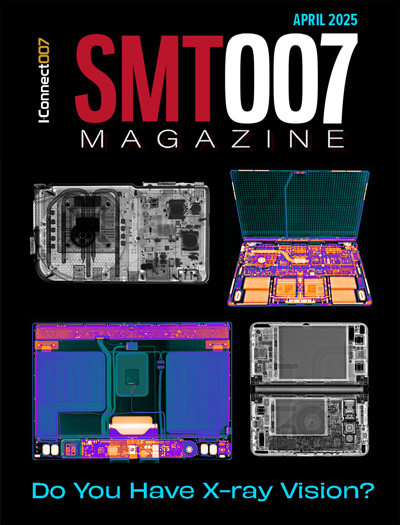-

- News
- Books
Featured Books
- smt007 Magazine
Latest Issues
Current Issue
Do You Have X-ray Vision?
Has X-ray’s time finally come in electronics manufacturing? Join us in this issue of SMT007 Magazine, where we answer this question and others to bring more efficiency to your bottom line.

IPC APEX EXPO 2025: A Preview
It’s that time again. If you’re going to Anaheim for IPC APEX EXPO 2025, we’ll see you there. In the meantime, consider this issue of SMT007 Magazine to be your golden ticket to planning the show.

Technical Resources
Key industry organizations–all with knowledge sharing as a part of their mission–share their technical repositories in this issue of SMT007 Magazine. Where can you find information critical to your work? Odds are, right here.
- Articles
- Columns
Search Console
- Links
- Media kit
||| MENU - smt007 Magazine
Estimated reading time: 4 minutes
It’s Only Common Sense: 7 Tips to Focus on What Works
In business, there’s always the temptation to be all things to all people, whether it’s expanding product lines, chasing every lead, or trying to keep up with competitors. The fear of missing out can lead to spreading our time, resources, and energy too thin. However, success doesn’t come from doing everything; it comes from doing the right things well.
1. Identify Your Core Strengths
The foundation of a successful business is understanding what you do best. Many companies fall into the trap of chasing trends or diversifying too quickly, forgetting the core strengths that made them successful. Ask yourself: “Where do we excel?” “What do we offer that sets us apart? “
For a PCB company, it might be quick-turn prototypes, high-reliability boards, or advanced materials expertise. Whatever it is, double down. Invest your time, training, and marketing efforts to showcase those strengths, and don’t waste resources on things that don’t align with your expertise. By focusing on your core strengths, you streamline operations and build a reputation as a leader that keeps customers returning.
2. Know Your Ideal Customer
Not every potential customer is a good fit. Attempting to serve everyone is a recipe for mediocrity. Instead, focus on your ideal customer—the one who benefits from your expertise and values what you offer. If you specialize in high-tech PCBs, your ideal customer might be a design engineer working on cutting-edge medical devices or aerospace technology. If you’re a generalist, your customer might be a small OEM needing reliable and cost-effective solutions.
Tailor your marketing, sales approach, and product development to meet your customers’ specific needs. What are their pain points? What solutions are they seeking? The more you understand them, the more effectively you can position yourself as their go-to provider.
3. Say ‘No’ to Distractions
Distractions come in many forms: a new product idea, a tempting customer segment, or an opportunity to partner with a high-profile company that doesn’t align with your goals. Distractions can drain your resources and divert your focus. Saying “no” isn’t easy, especially when the opportunity looks good on paper. But every “yes” outside your core focus is a “no” to something that matters.
Think of your business as a garden. If you plant too many things in the same soil, none will thrive. However, if you concentrate on a few crops, you can nurture them to their potential. Your energy and resources are finite. Guard them.
4. Quality Over Quantity
We live in a world that glorifies scale: more customers, more products, more likes, more followers. It’s easy to believe that success is a numbers game, but building meaningful relationships with key customers often delivers better results. Long-term relationships create trust, loyalty, and consistent business, which are more valuable than a one-off sale. For instance, if you’re in the PCB industry, a handful of loyal customers who trust you with their most complex projects will bring you more business than a dozen one-time orders from companies who treat you as interchangeable. Focus on providing outstanding service, solving problems, and becoming an indispensable partner. The rewards will follow.
5. Measure What Matters
Not all metrics are created equal. It’s easy to become bogged down in numbers that look impressive but don’t move the needle. Website visits and social media likes are vanity metrics. Instead, focus on metrics that align with your strategic goals, such as:
- Customer retention rates
- Profit margins
- Cycle times for delivering products
- Employee satisfaction and productivity
By tracking what matters, you can make informed decisions that drive growth.
6. Adapt but Stay Aligned
Flexibility is critical. Markets change, and customer needs and technology evolve. Companies that refuse to adapt risk becoming irrelevant. However, there’s a difference between adapting to change and losing sight of your vision. Adaptation means adjusting, while staying true to your core purpose. If your customers demand eco-friendly solutions, you might introduce green manufacturing practices, but you wouldn’t abandon your focus on quality or innovation to chase trends. Think of it as navigating a ship. You might need to change course to avoid an obstacle, but you don’t lose sight of your destination. Maintain your long-term vision and ensure your actions align with that vision.
7. Sustainability is Scalability
Spreading yourself too thin is a recipe for burnout, inefficiency, and missed opportunities. Focused efforts create a solid foundation for growth. Sustainability is about pacing yourself and your team, setting realistic goals, and sticking to them. It’s also recognizing that small, consistent steps often lead to greater success.
Consider your team’s bandwidth. Don’t ask them to juggle 10 priorities simultaneously. Instead, provide resources and support for them to excel in several areas. That way, you’ll create a business that’s not only profitable but also enjoyable to run.
Bringing It All Together
Focusing your efforts is a mindset. It’s recognizing you can’t be everything to everyone, and that’s OK. Success comes from clarity, discipline, and staying true to what you do best. By identifying your core strengths, targeting the right customers, saying no to distractions, prioritizing quality over quantity, measuring what matters, adapting strategically, and building sustainable practices, you set yourself up for long-term success.
Next time you feel pulled in multiple directions, ask yourself: “Does this align with what we’re trying to achieve?” If the answer is no, let it go. Focus on what works and matters, and watch your business thrive.
After all, it’s only common sense.
Dan Beaulieu is president of D.B. Management Group.
More Columns from It's Only Common Sense
It’s Only Common Sense: The Danger of OverthinkingIt’s Only Common Sense: Why Building a Strong Personal Brand Is Critical
It’s Only Common Sense: Be the Solution, Not the Problem
It’s Only Common Sense: Follow Through and Keep Your Promises
It's Only Common Sense: Maximizing the Five Stages of Your Trade Show Exhibit
It’s Only Common Sense: Success—The Devil's in the Details
It’s Only Common Sense: Stop Trying to Be Perfect—Progress Over Perfection
It’s Only Common Sense: Why Honesty is Your Best Sales Strategy


